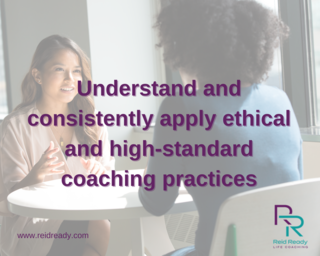Coaching
How to Find a Legitimate Coach
How to benefit from legitimate coaching and avoid being deceived.
Posted November 20, 2021 Reviewed by Abigail Fagan
Key points
- The coaching industry is not federally or state regulated. As such, anyone can call themselves a coach.
- There are self-governing bodies comprised of thousands of scholar-practitioners who qualify coaches, and who set the industry standard.
- The key to not being scammed is knowing what coaching is and learning how to identify those who are professional coaches, and those who are not.

Coaching scams have become an important concern, and not just to me. Many people seem to be interested in the topic. Because coaching scams impact both professional coaches and coaching clients, it is necessary to continue the dialog and help educate you, as a consumer, on how to minimize your chances of being scammed.
Is Coaching a Scam?
The answer...depends on who is selling coaching and what they are delivering to you. There are many self-proclaimed coaches who have not had approved coach-specific training or who pawn business consulting or spiritual advice off as coaching. Unfortunately, coaching is not a federal or even state regulated field like teaching, cosmetology, certified accounting, social work or the practice of law and medicine. As such, anyone can decide to call themselves a coach without proof of professional development or credentials. Several motivational speakers, entrepreneurs, or individuals who build and sell systems are considered self-proclaimed coaches. They have a unique experience or talent and they "teach" you how to get where they are in your career or personal life.
From my point of view, motivational speakers, entrepreneurs, business owners are not specifically coaches. Now, they might use coaching tools and techniques. But this does not make them professional coaches. This is the biggest concern or "con" for the coaching industry and why people question the validity of coaching. How can you tell if a coach is a scam? Actually, the real question we should ask is: Has the person who promotes themselves as a coach been recognized (through approved coach training and certification) by one of the major coach credentialing bodies (International Coaching Federation, Board of Certified Coaches, Association of Coaches, European Mentoring & Coaching Council)? It is important to note that many coach credentialing organizations also belong to the Global Mentoring & Coaching Alliance—which consists of scholar-practitioners from different countries who are doing scientific and meaningful work in the coaching industry, and who set the criteria for professional coaching (in lieu of federal or state regulations).
Before I continue, let me define coaching. I will use the International Coaching Federations definition: "Coaching is partnering with clients in a thought-provoking and creative process that inspires them to maximize their personal and professional potential. Coaching is a client-driven process" (ICF, 2021). What is also important to mention is that coaches do not tell you what or how to take action. We don't give direct advice and we do not impart our subjective beliefs to our clients.
Now that we know what coaching is, let's talk about professional coaching, specifically. Professional coaching means that you are getting paid by someone to specifically deliver a coaching approach and facilitate the coaching process throughout the partnership. When you attend a conference or workshop event with a motivational speaker or entrepreneur, you are experiencing oration that inspires you. They may give you tips, share their blueprint or story of overcoming and you may feel a "temporary" renewed sense of purpose. But, that speaker is not partnering with you in a thought-providing process, holding you accountable, or supporting your growth during or after the conference or workshop. You are not receiving key self-discovery lessons for the longer journey, which is inherent when coaching.
For example, if you come hear me speak, and I say "go home and think about it...write it in your journal...this is what worked for me, you can do it too..." where is the accountability? How do I know what tools or resources you can maximize to move forward? How do I know the root cause of your actions or lack thereof? If you purchase online programs, e-books, material or watch videos, that isn't coaching. Yes, self-proclaimed coaches may be using coaching techniques, and you feel inspired, but what are they "legally and ethically" providing you, and are you clear about what are you purchasing?
A professional coach legally and ethically agrees to facilitate and deliver a coaching experience "with" you. Therefore, coaching is its own method of helping motivate, inspire and move you forward by asking powerful questions, sharing observations, and making connections between what you are saying and what you are doing. Coaching incorporates action planning, strategy and productive communication over a period of time. The criteria for coaching are based on ethical standards, professional development, and clear expectations the coach invests in and then uses to support you (Gupta, et al., 2021). Coaching is also backed by research (Ammentorp & Kofoed, 2010; Knight & Christian van Nieuwerburg, 2012). As such, a person who follows the consistent practice of coaching and fully follows through on the process can distinguish themselves from those who do not. In fact, the U.S. Dept. of Agriculture, Office of Human Resource Management, has a great breakdown explaining the differences between coaching and other helping areas.
My conclusion is that coaching (in itself) is not a scam. However, there are people who may use the concept of coaching as a way to scam you. There are folks who don't realize they aren't professional coaches. With that said, coaching has proven to be a well-respected industry that has benefited different fields (Laske, 2006). It is also a tool or approach, backed by scientific research within the field of psychology (Gupta, et al., 2021; Laske, 2006). Its flaw is anyone can call themselves a coach without actually learning how to apply the art of coaching. There are people who take advantage of others by calling themselves professional coaches, when they are not, and who sell you something other than coaching. Yes, they may use coaching techniques but that alone isn't what makes them a professional coach.
So, beware. Do your research. Check credentials and training, and be clear on what you are buying—read the written agreement. More importantly, confirm if the person is recognized or credentialed by one of the self-regulatory and credentialing bodies in the coaching industry. That way, you are less likely to get scammed and more likely to actually experience the benefits of coaching.
References
Ammentorp, J. & Kofoed, P. (2010). Coach training can improve the self-efficacy of neonatal nurses. A pilot study. Patient Education and Counseling, 79(2), 258-261.
Gupta, M., Gupta, A., Garg, R., & Agrawal, R. (2021). Coach training: Impact beyond coach training. International Journal of Research in Business and Social Science, 10(4), 150–168. https://doi.org/10.20525/ijrbs.v10i4.1170
International Coaching Federation. (2021). What is coaching? Retrieved from https://coachingfederation.org/ website.
Knight, J., & van Nieuwerburgh, C. (2012) Instructional coaching: a focus on practice, Coaching: An International Journal of Theory, Research and Practice, 5(2), 100-112, DOI: 10.1080/17521882.2012.707668


